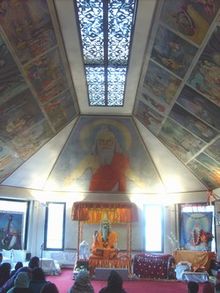Balmikism: Difference between revisions
Content deleted Content added
→top: removed unsourced clause: not limited to this caste Tag: Reverted |
|||
| Line 3: | Line 3: | ||
[[File:Balmiki.jpg|thumb|right|A [[Ashram (Balmiki)|Balmiki Ashram]] in [[Punjab, India|Punjab]], India.]] |
[[File:Balmiki.jpg|thumb|right|A [[Ashram (Balmiki)|Balmiki Ashram]] in [[Punjab, India|Punjab]], India.]] |
||
{{Balmikism small}} |
{{Balmikism small}} |
||
'''Balmikism''' is a [[Hindu]] that reveres the sage [[Valmiki|Balmiki]] (also known as Bala Shah or Lal Beg) as their ancestor as a [[patron saint]].<ref name="Kananaikil1983"/> Followers believe that Balmiki was an [[avatar]] of God, and they consider his works, the ''[[Ramayana]]'' and the ''[[Yoga Vasistha]]'', as their holy [[scripture]].<ref name="Kananaikil1983">{{cite book |last1=Kananaikil |first1=Jose |title=Scheduled Castes and the Struggle Against Inequality: Strategies to Empower the Marginalised |date=1983 |publisher=Indian Social Institute |page=17 |language=English}}</ref> Balmiki is often depicted as wearing red clothing and is thus known as Lal Bhekh (or Lal Beg).<ref name="Leslie2017">{{cite book |last1=Leslie |first1=Julia |title=Authority and Meaning in Indian Religions: Hinduism and the Case of Valmiki |date=22 November 2017 |publisher=Routledge |isbn=978-1-351-77299-0 |page=51 |language=English}}</ref> |
'''Balmikism''' is a [[Hindu]] sect of the [[Chuhra]] caste that reveres the sage [[Valmiki|Balmiki]] (also known as Bala Shah or Lal Beg) as their ancestor as a [[patron saint]].<ref name="Kananaikil1983"/> Followers believe that Balmiki was an [[avatar]] of God, and they consider his works, the ''[[Ramayana]]'' and the ''[[Yoga Vasistha]]'', as their holy [[scripture]].<ref name="Kananaikil1983">{{cite book |last1=Kananaikil |first1=Jose |title=Scheduled Castes and the Struggle Against Inequality: Strategies to Empower the Marginalised |date=1983 |publisher=Indian Social Institute |page=17 |language=English}}</ref> Balmiki is often depicted as wearing red clothing and is thus known as Lal Bhekh (or Lal Beg).<ref name="Leslie2017">{{cite book |last1=Leslie |first1=Julia |title=Authority and Meaning in Indian Religions: Hinduism and the Case of Valmiki |date=22 November 2017 |publisher=Routledge |isbn=978-1-351-77299-0 |page=51 |language=English}}</ref> |
||
[[Ashram (Balmiki)|Balmiki mandirs]] (temples) are open to all and the most important festival celebrated by Balmiki Hindus is Balmiki Jayanti, which marks the birthday of Balmiki.<ref name="Dalal2014">{{cite book |last1=Dalal |first1=Roshen |title=Hinduism: An Alphabetical Guide |date=18 April 2014 |publisher=Penguin UK |isbn=978-81-8475-277-9 |language=English}}</ref> |
[[Ashram (Balmiki)|Balmiki mandirs]] (temples) are open to all and the most important festival celebrated by Balmiki Hindus is Balmiki Jayanti, which marks the birthday of Balmiki.<ref name="Dalal2014">{{cite book |last1=Dalal |first1=Roshen |title=Hinduism: An Alphabetical Guide |date=18 April 2014 |publisher=Penguin UK |isbn=978-81-8475-277-9 |language=English}}</ref> |
||
Revision as of 02:17, 20 November 2020

| Part of a series on the |
| Balmikism |
|---|
| Ramayana |
| Ashram |
| Community |
|
|
Balmikism is a Hindu sect of the Chuhra caste that reveres the sage Balmiki (also known as Bala Shah or Lal Beg) as their ancestor as a patron saint.[1] Followers believe that Balmiki was an avatar of God, and they consider his works, the Ramayana and the Yoga Vasistha, as their holy scripture.[1] Balmiki is often depicted as wearing red clothing and is thus known as Lal Bhekh (or Lal Beg).[2]
Balmiki mandirs (temples) are open to all and the most important festival celebrated by Balmiki Hindus is Balmiki Jayanti, which marks the birthday of Balmiki.[3]
See also
References
- ^ a b Kananaikil, Jose (1983). Scheduled Castes and the Struggle Against Inequality: Strategies to Empower the Marginalised. Indian Social Institute. p. 17.
- ^ Leslie, Julia (22 November 2017). Authority and Meaning in Indian Religions: Hinduism and the Case of Valmiki. Routledge. p. 51. ISBN 978-1-351-77299-0.
- ^ Dalal, Roshen (18 April 2014). Hinduism: An Alphabetical Guide. Penguin UK. ISBN 978-81-8475-277-9.
